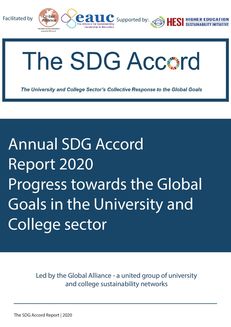The SDG Accord report 2020, endorsed by UN Environment, paints a promising picture of the embedding of the UN Sustainable Development Goals (SDGs) in universities and colleges across the world, despite the global pandemic.
The findings from the third SDG Accord annual progress report show awareness of the SDGs in universities and colleges across the world is steadily increasing. The number of institutions committing to the SDG Accord continues to rise and so too does the ambition to embed the SDGs within education institutions. Those that start to embed the SDGs do so at a very rapid pace, and the breadth and depth of initiatives institutions a few years into embedding the SDGs are undertaking the world over is truly inspiring.
From the institutional signatories of the Accord, 83 institutions from across the world reported on their progress on the SDGs over the academic year 2019-2020. This is an increase of 63% on the number that submitted reporting last year, and is reflective of the growth in the sector on this agenda.
Key findings:
- Almost 90% of those reporting have started to or have successfully mapped the SDGs within their institution. That is up 20% on those reporting last year.
- Signatories were almost unanimous in saying aligning with the SDGs was positive or extremely positive (96%).
- Over two thirds (68%) said the SDGs are a strategic priority (it is included, or will imminently be included in the institution's overarching strategy).
- The main benefit institutions are enjoying from aligning or starting to align with the SDGs is that it has ‘Opened a more relatable and clearer dialogue on sustainability within the institution’ (90%).
- The SDGs that reporting institutions will prioritise over the next 12 months are SDG 13 – Climate Action (68%), SDG 4 – Quality Education (57%) and SDG 3 Good Health and Well-being (39%).
- Funding and capacity remained the primary barrier for institutions. Other barriers commonly reported where around a lack of awareness from both staff and students, lack of government guidance, and a lack of best practice to learn from.
We also asked for updates on progress with the recommendations made last year:
- Just under half (43%) of submissions said their institution requires researchers to outline which of the SDGs their work contributes towards in the research application process.
- Two thirds (66%) of institutions this year reported that when updating new processes over the last year, the SDGs had been incorporated.
- Almost three quarters (72%) of signatories reported they had found innovative ways to increase student and staff capacity to address the SDGs.
Iain Patton, CEO at the EAUC – the Alliance for Sustainability Leadership in Education, said:
“These are proving to be truly inspirational Global Goals, and institutions that embrace them are reaping the rewards as they report how powerful an engagement tool the SDGs are showing themselves to be. There has never been a more critical time for universities and colleges to become more sustainable. Embedding the SDGs into the education, research, leadership, operations, administration and engagement activities of an institution is not just the right thing to do, but it is necessary – the SDGs help institutions become resilient and form stronger anchors in their community.
“The pandemic is a stark reminder though, that we must go further and with speed to embed sustainable development throughout society, but especially in our education sector. There are only 3,308 days to meet the Sustainable Development Goals 2030 deadline. And it is a deadline, not a target - change must happen now, and the education sector must be, as ever, a key pillar.
“We hope to see more institutions from across the world signing up to the SDG Accord, and embedding the SDGs holistically across their campus in 2021. Those that submitted reports this year offer ambitious and inspirational examples of SDG initiatives, and this is what we need the world over to tackle the climate crisis and other global challenges of our time.”
Sam Barratt, Chief, Education and Youth for UN Environment Programme and Chair of the Higher Education Sustainability Initiative, said:
“We now have a decade to deliver the SDGs and while ten years can feel like a life time, we have no time to lose. We are what we teach and education institutions will be key to making this cross-roads a success. If they continue to make progress with the SDGs within their institutions then this ripples out in the mindsets of the students and out into their communities.
“Phrases such as the ‘new normal’ or ‘build back better’ have been commonly used in 2020. But for 2021, we can’t go back to the old habits of the past, but must build new behaviours and choices for the future and really use this moment as a chance for renewal. That shift won’t be easy, but if we are to secure a better and more resilient tomorrow, we need to rethink what we are currently doing today.”
The summary findings were also presented at the UN High-level Political Forum in July 2020.





 Except where otherwise stated, content on this site is
licensed under a Creative Commons Attribution 3.0 License.
Except where otherwise stated, content on this site is
licensed under a Creative Commons Attribution 3.0 License.
